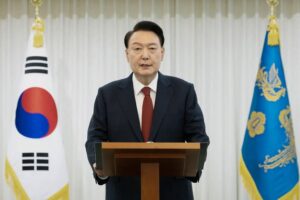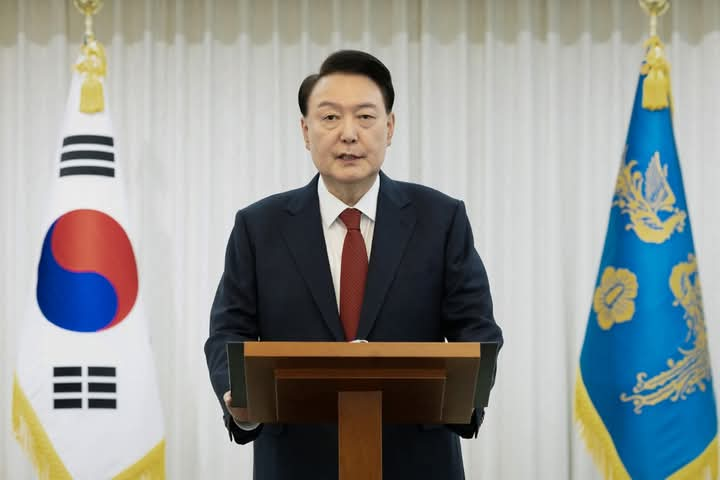
By Adeyemi Adekunle
As South Korea’s Constitutional Court approaches a pivotal decision in March on whether to impeach President Yoon Suk Yeol, the atmosphere surrounding the hearings has grown increasingly charged with geopolitical implications. The court’s deliberations come in the wake of President Yoon’s controversial martial law proposal last December, which has ignited fierce debates about national security and foreign influence, particularly from China.
Since the National Assembly voted to impeach Yoon on December 14, the court has conducted nine hearings, culminating in the final session scheduled for Thursday. Central to the impeachment discussions are allegations of external meddling in South Korea’s political landscape, with Yoon’s defense stressing the necessity of robust counterintelligence efforts against perceived threats from Beijing.
At the heart of Yoon’s martial law bid was his assertion that “anti-state forces” were at work, a claim that included allegations of Chinese interference in South Korean politics, elections, and media. His attorney, Cha Gi-hwan, has taken a vigorous stance during the hearings, alleging that foreign influence—especially from China—poses a significant threat to South Korean sovereignty.
“President Yoon’s statements reflect grave concerns regarding the extent of Chinese espionage and interference,” Cha argued, urging the court to consider the broader implications of the martial law proposal, which was intended as a safeguard against potential foreign espionage activities.
The controversy was notably heightened by an incident involving Chinese nationals flying drones to document a U.S. aircraft carrier docked in South Korea’s Busan, an act that Yoon cited as part of his rationale for the emergency measures. The incident raised alarms about the security of critical military assets and sparked outrage among nationalists in South Korea.
This sentiment has been echoed by the ruling People Power Party (PPP), which has been advocating for amendments to the nation’s anti-espionage laws. Their proposal seeks to expand the legislation’s scope from targeting defined “enemy states” to encompassing all “foreign countries,” a move they argue is essential in countering threats posed specifically by Chinese espionage.
However, the suggested revisions have faced resistance from the opposition Democratic Party of Korea (DPK), which expressed concerns that such a shift could pave the way for the misuse of the law against political adversaries. “We must balance security with democratic principles; otherwise, we risk undermining the very foundations of our democracy,” a DPK spokesperson stated.
The accompanying tensions reflect broader anxieties about the balance of power in the region, particularly as the United States and South Korea increasingly strengthen their military alliance to counter Chinese growth and aggression.
Analysts suggest that the outcome of this impeachment proceedings may have lasting implications, not only for South Korean domestic politics but also for its international relations and security posture. With China’s assertive policies in the Indo-Pacific region and its growing influence over South Korea’s economy and politics, the stakes are high.
“The court’s ruling may set a decisive precedent regarding how foreign influence is perceived and managed in South Korea,” said political analyst Kim Ji-soo. “If Yoon is impeached, it could signal a shift away from his administration’s hardline stance against China, and vice versa if he remains in power.”
As public scrutiny intensifies, the ruling will likely address broader questions about the integrity of South Korean democracy in the face of increasing external pressures. With South Koreans divided over Yoon’s presidency, the constitutional court’s decision may also shape the public sentiment ahead of upcoming elections, further complicating South Korea’s political landscape.
In the interim, calls for a reevaluation of both security protocols and foreign relations policies abound, as South Korea grapples with its position amid a rapidly changing geopolitical environment. Regardless of the court’s ruling, it’s clear that the interplay between domestic political struggles and international dynamics will continue to define South Korea’s path forward.
As the final hearings approach, all eyes will be on the court and the potential ramifications of its decision—an intersection of law, politics, and international relations that could reverberate across the region for years to come.




